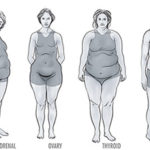Avoid menopausal weight gain with simple lifestyle changes

The hormonal changes that come with menopause make one more prone to gaining weight around the abdomen, thighs and hips, but it’s not the hormones themselves to cause the accumulation of the excess pounds. The weight gain is usually the result of a combination of factors, including aging, genetics and lifestyle factors.
As you get older, it becomes more difficult to maintain a lean body and keep the belly fat away, but menopause weight gain is not inevitable. One of the triggers is the decrease in lean mass, which causes the metabolism to slow down and thus makes you burn calories at lower rates than before.
This makes it more challenging to maintain a healthy weight, but not impossible. As long as you continue to eat healthy and to exercise daily so as to stimulate the metabolic rate, you can stay slim and avoid the menopausal weight gain. Given below are three simple lifestyle tricks that will help you manage this issue easier.
1. Increase the metabolic rate by increasing physical activity
One study found that women who eat the same number of calories a day will gain weight at age 50, even if that amount helped them maintain a lean body in their 20s. One can gain about five pounds of body fat and increase their waist circumference by about one inch because of the decrease in the metabolic rate after menopause, so the first tip is this: to maintain a slim body, increase the time spent exercising or the intensity of your workouts.
You can also reduce the intake of calories, but if you only rely on a caloric deficit there will come a moment when you’ll no longer be able to control your weight through diet alone, and it will be more difficult to start exercising then if you’ve been sedentary your entire life. So do yourself a favor now and start a daily exercise program.
Keep the workouts varied – combinations of cardio and strength training exercises are the best for fat loss – and exercise for 40-60 minutes a day, at medium to high intensity, to maintain a fast metabolism.
2. Reduce the sugar intake to control insulin sensitivity
Menopause comes with a decrease in insulin sensitivity, which reduces the body’s ability to use carbohydrates for energy production. This means that instead of burning the same amount of carbs for fuel, your body becomes more likely to store then in the adipose tissues on your abs, hips, thighs and buttocks. This also happens in men so it’s not a female problem only.
To manage this issue correctly, try to reduce the intake of sugar and to reevaluate the carbohydrate intake, as you may be eating too many carbs without even realizing it. Opt mostly for green leafy veggies, tomatoes, cucumbers and other vegetables that are poor in calories but rich in nutrients, and consume fruits instead of sweets as dessert.
3. Eat slowly and control your portions
Eating slowly allows your stomach to digest foods properly and to break them into building blocks which are then used for energy production. This good habit prevents overeating as your brain receives signals that tell it that the stomach is full “in real time”; on the contrary, when you eat too fast, these signals aren’t sent properly as the body can’t process the consumed food that fast. As a result, your brain thinks you’re still hungry and makes you want to eat more.
Controlling your portions is another useful strategy that can help in maintaining weight after menopause. So instead of relying on your stomach to signal its fullness, fill your plate with only one serving of food, and eat slowly. If you still feel hungry after the meal, add a piece of fruit or a small, plain yogurt, but avoid adding another serving of food, as this is what favors weight gain.
If dining out or eating at friends, try to either share your meal if the portion is too large, or simply eat only half and take the rest home, to serve it the next day. It’s a lot better for your silhouette, stomach and blood sugar levels to eat smaller portions instead of larger ones, especially if they’re rich in carbs and fats.
Have something to add to this article? Comment below or join our Facebook community and share your thoughts with us!













